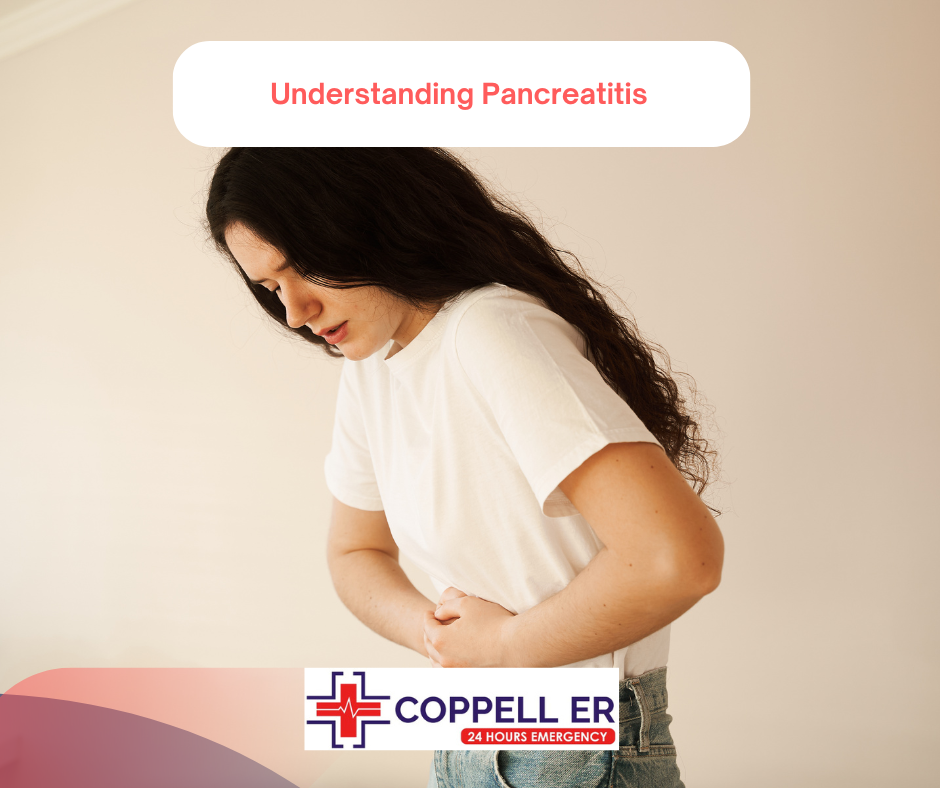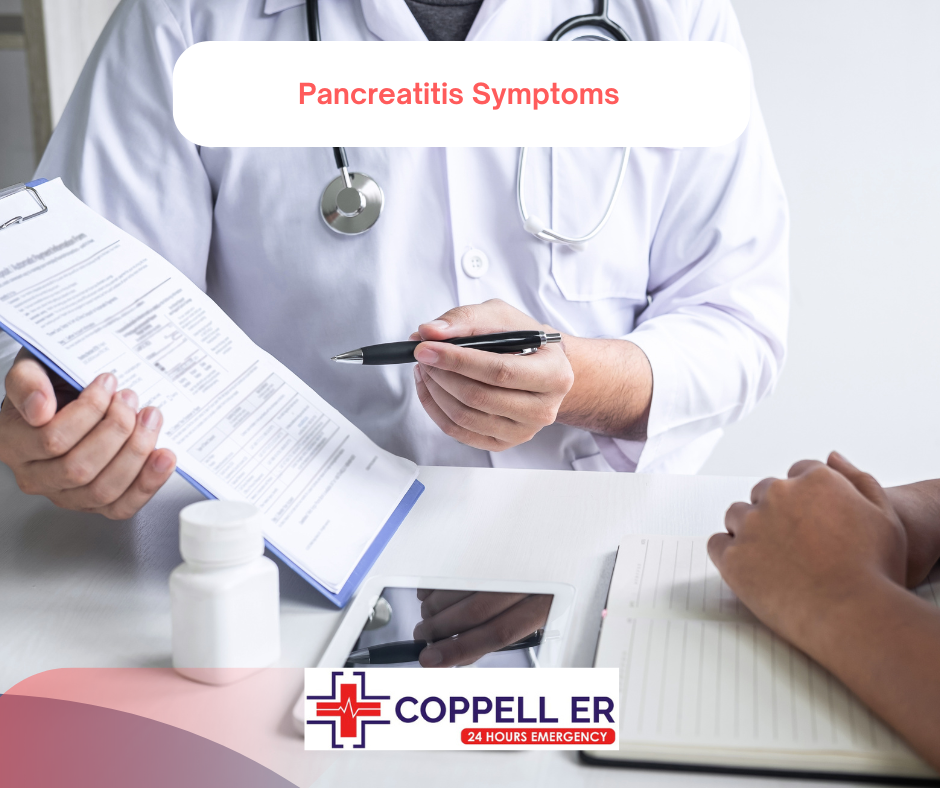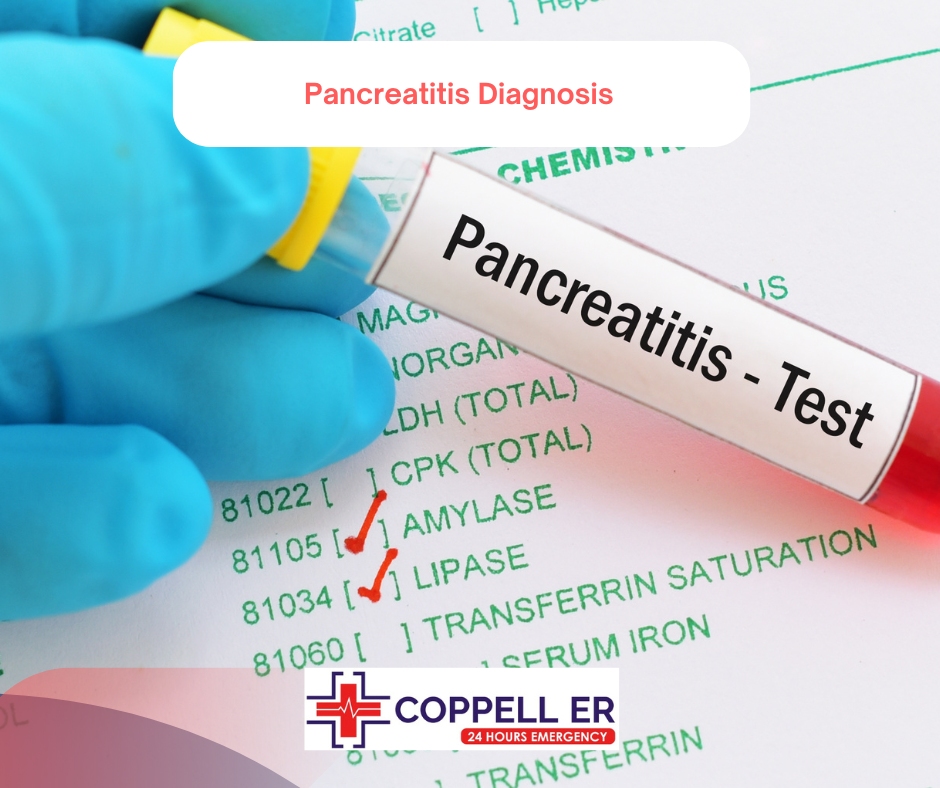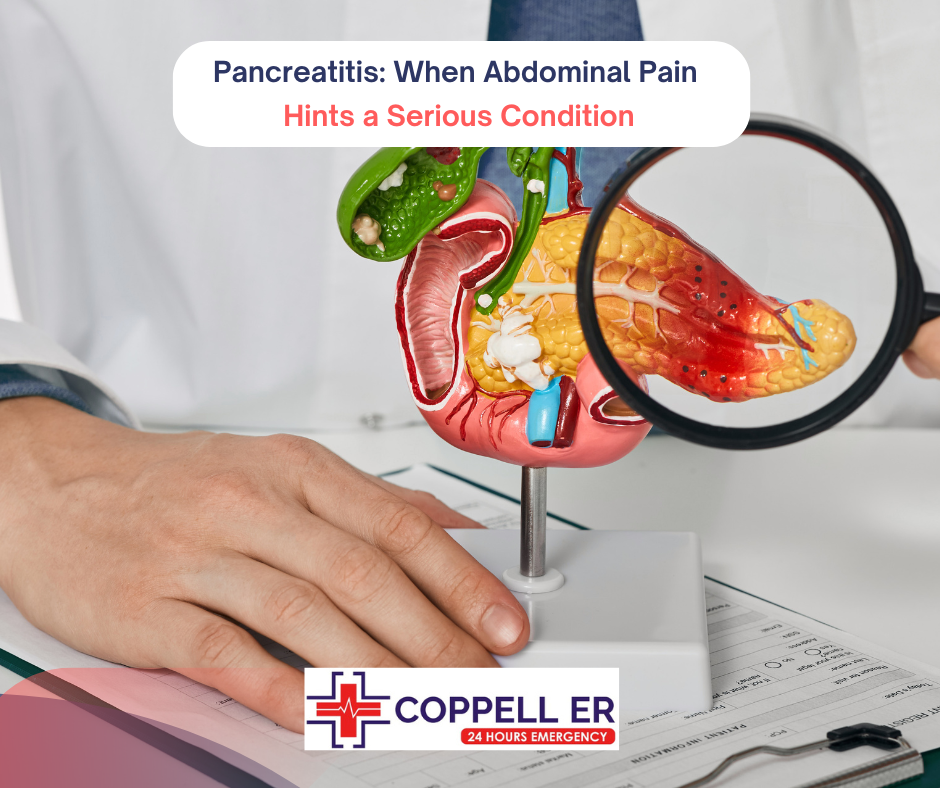Sharp upper abdominal pain spreading to your back isn’t always indigestion. It could signal pancreatitis, a dangerous inflammation of the pancreas that can turn deadly without immediate treatment.
Gallstones and heavy drinking cause most cases, though early symptoms look deceptively similar to common stomach problems. Without treatment, Inflammation of the pancreas can progress to organ failure, widespread infection, or death.
So how do you tell if your abdominal pain signals pancreatitis? And what steps should you take if you suspect you have it?
Get Emergency Care for Pancreatitis
Understanding Pancreatitis

Pancreatitis is inflammation of the pancreas, causing swelling and pain that often radiates from the abdomen to the back. Your pancreas is about the size of your hand and sits between your stomach and spine.
This vital organ plays a crucial role in digestion and blood sugar regulation. It produces digestive enzymes (such as amylase) and hormones (like insulin) and transfers these to the small intestine via the pancreatic duct.
Inflammation is a response from your immune system to injury, intended to help heal damaged tissues. In the case of Inflammation of the pancreas , the inflammation is often due to gallstones blocking the pancreatic duct or excessive alcohol consumption.
Acute Pancreatitis vs. Chronic Pancreatitis
Acute pancreatitis is a temporary condition caused by brief pancreatic injury. Most cases resolve within a few days with appropriate supportive care, including rest, hydration, and pain management. However, in severe cases, acute Inflammation of the pancreas can lead to serious health complications.
Chronic pancreatitis is a long-term, progressive illness resulting from ongoing pancreatic damage. Over the years, this condition can lead to permanent harm to the pancreas. Persistent inflammation results in scarring of pancreatic tissues (known as fibrosis), which impairs the pancreas’s ability to produce digestive enzymes and hormones.
Does Pancreatitis Pain Come and Go?
Inflammation of the pancreas pain patterns differ by type. Acute Inflammation of the pancreas causes constant severe pain lasting 3-7 days until inflammation resolves, while chronic pancreatitis pain comes and goes with weeks or months of relief between episodes.
- Acute Pancreatitis Pain Pattern
Pain starts intense and stays severe throughout the episode. You won’t find relief through position changes or rest. The discomfort remains constant until treatment addresses the inflammation, typically within 3-7 days.
- Chronic Pancreatitis Pain Pattern
Pain appears and disappears unpredictably. You may feel normal for weeks or months, then experience sudden severe episodes lasting several hours. These attacks often follow fatty meals or alcohol consumption before subsiding on their own.
Pancreatitis Symptoms

Symptoms of Acute Pancreatitis
- Severe Abdominal Pain
- Nausea and Vomiting
- Fever
- Fast Heart Rate
- Rapid, Shallow Breathing
- Tenderness in the Abdomen
- Swollen Abdomen
Chronic Pancreatitis Symptoms
- Persistent Abdominal Pain
- Indigestion
- Loss of Appetite
- Unintended Weight Loss
- Fatty, Oily Stools
- Lightheadedness
Acute pancreatitis is often more intense and may have a sharp, penetrating sensation. Your abdomen might be tender when touched. In contrast, chronic pancreatitis involves pain that can vary in intensity. It may come and go, but usually does not completely resolve. You might experience increased pain after eating, and for some individuals, the pain may be continuous.
Notably, symptoms of Inflammation of the pancreas and general abdominal pain can often overlap. If you or a loved one is experiencing abdominal pain, especially if it’s severe or persistent, consult a healthcare professional immediately for an accurate diagnosis and appropriate treatment.
Comprehensive Guide to Abdominal Pain
Pancreatitis Causes
The leading causes of pancreatitis are:
- Gallstones: When a gallstone blocks the common bile duct, it can obstruct the flow of pancreatic juices. This blockage causes the digestive enzymes to accumulate and start digesting the pancreas itself, resulting in gallstone pancreatitis.
- Heavy Drinking: Excessive alcohol consumption is a significant cause of Inflammation of the pancreas . While the precise mechanism is not fully understood, it’s known that the toxic byproducts of alcohol or the activation of digestive enzymes within the pancreas can lead to inflammation. Heavy drinking is estimated to account for approximately half of all cases of both acute and chronic pancreatitis.
Other less common causes include:
- Infections: Certain viruses can lead to pancreatitis.
- Autoimmune Diseases: Conditions where the immune system attacks the pancreas, such as autoimmune pancreatitis.
- Genetic Mutations: Inherited genetic conditions can cause Inflammation of the pancreas.
- Cystic Fibrosis: Complications from this genetic disorder can affect the pancreas.
- High Triglyceride Levels: Elevated levels of triglycerides in the blood can trigger pancreatitis.
- High Calcium Levels: Excessive calcium in the blood (hypercalcemia) can contribute to inflammation of the pancreas.
- Ischemia: Reduced blood flow to the pancreas can lead to inflammation.
- Cancer: Tumors in the pancreas or nearby organs can cause Inflammation of the pancreas.
- Trauma: Physical injury to the pancreas can result in inflammation.
- Medications: Some drugs can irritate the pancreas and trigger inflammation.
Pancreatitis Diagnosis

Clinical Evaluation
The first step in diagnosing pancreatitis is a detailed medical history and physical examination. Your doctor will ask about your symptoms, such as abdominal pain, nausea & vomiting, and changes in bowel movements. They will also consider risk factors like alcohol consumption, certain medications, or a history of gallstones.
Laboratory Tests
Several blood tests are commonly used to diagnose Inflammation of the pancreas and assess its severity:
- Amylase and Lipase Levels: Elevated levels of these digestive enzymes can indicate pancreatitis.
- Complete Blood Count (CBC): This test helps identify signs of infection or inflammation.
- Liver Function Tests: These can help determine if gallstones are causing the Pancreatic disease.
Imaging Tests
Imaging tests are crucial for visualizing the pancreas and detecting any complications or underlying causes:
- Abdominal Ultrasound: This test helps identify gallstones or other abnormalities in the abdominal organs.
- CT Scan: A computed tomography scan provides detailed images of the pancreas and can reveal inflammation, fluid collections, or other complications.
- MRI: Magnetic resonance imaging may be used if CT results are inconclusive or if there is a need for additional detail.
Endoscopic Procedures
In some cases, endoscopic techniques are used to diagnose and manage pancreatitis:
- Endoscopic Retrograde Cholangiopancreatography (ERCP): This procedure involves inserting a flexible tube with a camera through the mouth to examine the bile and pancreatic ducts. It can also be used to remove gallstones or place stents.
Additional Tests
Depending on the underlying cause of Inflammation of the pancreas , further tests may be needed:
- Genetic Testing: Used to identify inherited forms of pancreatitis.
- Pancreatic Function Tests: Evaluates the pancreas’s ability to function and produce digestive enzymes.
- Glucose Test: Assesses whether the pancreas is producing insulin effectively.
- Stool Elastase Test: Determines if the pancreas is generating adequate digestive enzymes.
- Fecal Fat Analysis: Detects excess fat in the stool, which can indicate fat malabsorption.
At Coppell ER, our state-of-the-art medical laboratory is equipped to perform all essential blood tests and diagnostic procedures needed for a rapid and accurate diagnosis of Pancreatic disease.
Pancreatitis Treatment
Treatment Overview
- Hospitalization: Most cases of pancreatitis require hospitalization for intensive care and close monitoring
- Fasting: Fasting from food and drink is usually necessary to allow the pancreas to rest and heal. Nutritional support may be provided through an IV or feeding tube.
- Pain Relief: Effective Inflammation of the pancreas pain relief involves using medications to manage discomfort.
- Hydration: IV fluids help maintain hydration and overall health.
- Treating the Cause: Addressing the underlying cause, such as gallstones or alcohol consumption, is crucial for effective treatment. This may include procedures like gallbladder removal or alcohol cessation programs.
- Antibiotics: If an infection is present, antibiotics may be prescribed.
Pancreatitis Management
- Lifestyle Changes: For pancreatitis management, avoiding alcohol, quitting smoking, and following a low-fat diet are key. These lifestyle adjustments help prevent flare-ups and complications.
- Enzyme Supplements: Pancreatic enzyme replacements assist with digestion and help manage symptoms.
- Insulin Therapy: If the condition affects insulin production, insulin therapy may be required.
- Nutritional Support: A dietitian can provide guidance on maintaining a balanced diet and preventing malnutrition.
- Surgery: In severe cases, surgical intervention may be necessary to remove damaged tissue or drain fluid collections.
If you experience severe abdominal pain, persistent nausea, or other significant symptoms,seek medical attention promptly. Regular follow-up is essential for effective Inflammation of the pancreas management and to prevent complications.
Request an Appointment for Pancreatitis Evaluation Now
FAQs
Is pancreatitis very serious?
Yes, Pancreatic disease can be very serious, especially if left untreated. It can lead to severe complications like organ failure, infections, or chronic pain, and in severe cases, it can be life-threatening.
Can you live a long life with pancreatitis?
Yes, many people with Pancreatic disease can live a long life with proper management and treatment.
Can Pancreatic disease go away without hospital?
Mild cases of Inflammation of the pancreas may improve with outpatient care and lifestyle changes, such as avoiding alcohol and following a special diet. However, severe cases often require hospitalization for intensive treatment and monitoring to prevent complications.
Can you fully recover from Pancreatic disease?
Yes, most individuals fully recover from Pancreatic disease , though some may experience recurring episodes.
How do you know if it’s a pulled muscle or pancreatitis?
Pulled muscle pain worsens with movement and improves with rest. Inflammation of the pancreas causes constant upper abdominal pain radiating to your back that doesn’t change with position, accompanied by nausea, vomiting, and fever.




